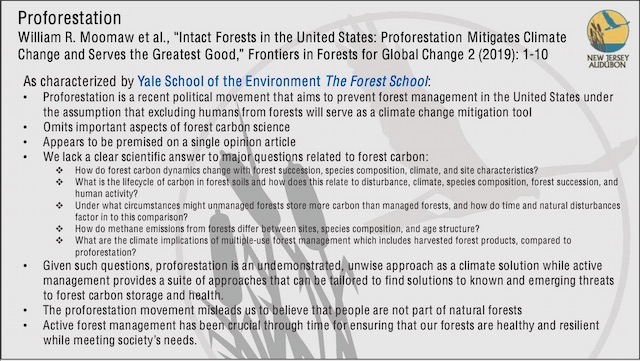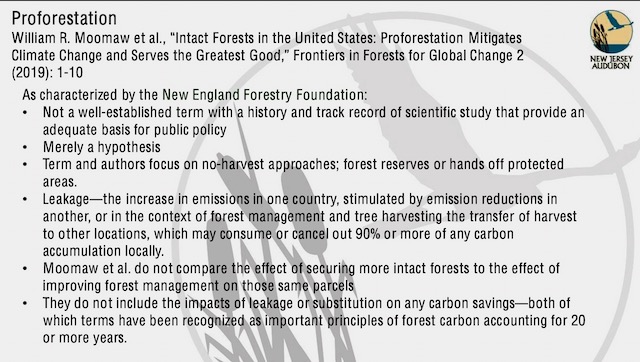Murphy DEP Assistant Commissioner For State Forests Opposed “Proforestation” – Continues To Defend Logging Of Forests
Cecil Dismissed Proforestation as a “political movement” and “unwise approach as a climate solution“
DEP Role In Legislative Forestry Task Force Undermines Efforts To Reform Current Logging Scheme
Climate Emergency Requires Preserving Existing Forests, Which Store Carbon
The recent formation of a legislative Task Force on Forest Management by Senate Environment Committee Chairman Bob Smith has focused attention on the role of forests in the climate emergency and the importance of reforms to how NJ DEP manages State lands – particularly State forests – and the need to strengthen standards and close loopholes for what are called “Forest Stewardship Plans” (for forests on both public and private lands).
Smith explicitly spoke of the need for a “new paradigm” in light of the climate emergency.
Politically, creation of the Task Force was the result of primarily two developments:
1) over a decade long failure to enact legislation to better protect State forests and respond to the climate emergency. Senator Smith had sponsored various “Forest Stewardship” bills that were biased towards logging. Those bills triggered strong public opposition, which blocked passage; and
2) DEP (and NJ Audubon) were logging State forests and Wildlife Management Areas, while promoting various fatally flawed “Forest Stewardship Plans” (both site specific, like Sparta Mt. and statewide, like the DEP “Forest Action Plan”, see:
All those DEP initiatives also triggered strong public opposition.
Clearly, the whole purpose of the Task Force is to reform the current DEP policy that parades as “Forest Stewardship”, given the failure of that policy and the strong public opposition to it.
So, at the Task Force’s kickoff meeting, I was surprised and disturbed by the fact the DEP was allowed to make a 30 minute presentation, ostensibly to craft the “narrative”, frame the agenda, and substantively flesh out Senator Smith’s charge to the Task Force. Worse, the presentation was made by DEP Assistant Commissioner John Cecil, who in his previous role as head of Corporate Stewardship at NJ Audubon had crafted and championed exactly those controversial pro-logging “Stewardship” policies that warranted reform.
I was aware of and a strong critic of Cecil’s work at NJ Audubon, particularly at Sparta Mountain Wildlife Management Area and as a consultant to Wall Street billionaire Peter Kellogg’s elite hunting grounds called Hudson Farm. Kellogg was a longtime major donor to NJ Audubon and provided an additional $330,000 to NJ Audubon to draft the Sparta Mt. WMA Forest Stewardship Plan.
Kellogg also funded a DEP forestry staff week long junket, see:
So, Mr. Kellogg – just like his Wall Street friend Gov. Murphy – knows how to spread money around to buy support.
I always knew Cecil was a hired gun, but I was not aware of Cecil’s more recent work – or of his blunt and transparent attack of forest preservation strategies to respond to the climate emergency.
Specifically, last spring (March 2021), just before he left NJA to join DEP, Cecil, current DEP Assistant Commissioner for State Parks, Forests and Historic Sites, made an important presentation to the NJ Pinelands Commission’s Climate Committee.
Cecil’s NJ Audubon presentation was titled: Forest Conservation – NJ Pinelands
Here’s how Cecil – in the final two slides of his presentation that promoted logging – dismissed as a “political movement” and “unwise approach as a climate solution“, the leading paper in important developing field of forest management known as “proforestation”:
Ironically, Cecil hypocritically attempts to dismiss proforestation as a “political movement” when he – both at NJ Audubon and now at DEP – have been extremely political in promoting logging of NJ’s forests, under the guise of various empty slogans.
Here is the scientific and policy rationale for preserving existing forests, a strategy deemed “proforestation”:
Climate change and loss of biodiversity are widely recognized as the foremost environmental challenges of our time. Forests annually sequester large quantities of atmospheric carbon dioxide (CO2), and store carbon above and below ground for long periods of time. Intact forests—largely free from human intervention except primarily for trails and hazard removals—are the most carbon-dense and biodiverse terrestrial ecosystems, with additional benefits to society and the economy. Internationally, focus has been on preventing loss of tropical forests, yet U.S. temperate and boreal forests remove sufficient atmospheric CO2 to reduce national annual net emissions by 11%. U.S. forests have the potential for much more rapid atmospheric CO2 removal rates and biological carbon sequestration by intact and/or older forests. The recent 1.5 Degree Warming Report by the Intergovernmental Panel on Climate Change identifies reforestation and afforestation as important strategies to increase negative emissions, but they face significant challenges: afforestation requires an enormous amount of additional land, and neither strategy can remove sufficient carbon by growing young trees during the critical next decade(s). In contrast, growing existing forests intact to their ecological potential—termed proforestation—is a more effective, immediate, and low-cost approach that could be mobilized across suitable forests of all types. Proforestation serves the greatest public good by maximizing co-benefits such as nature-based biological carbon sequestration and unparalleled ecosystem services such as biodiversity enhancement, water and air quality, flood and erosion control, public health benefits, low impact recreation, and scenic beauty.
Mr. Cecil is a former consultant who was well paid to craft plans to log NJ forests.
He is an aggressive advocate of logging (under the slogans “active management” or “Stewardship”) who has both conflicts of interest and scientific bias, regarding forest management issues.
Those conflicts and bias should force his recusal from forest management decisions at DEP and disqualify him from participation in the Task Force’s deliberations.

